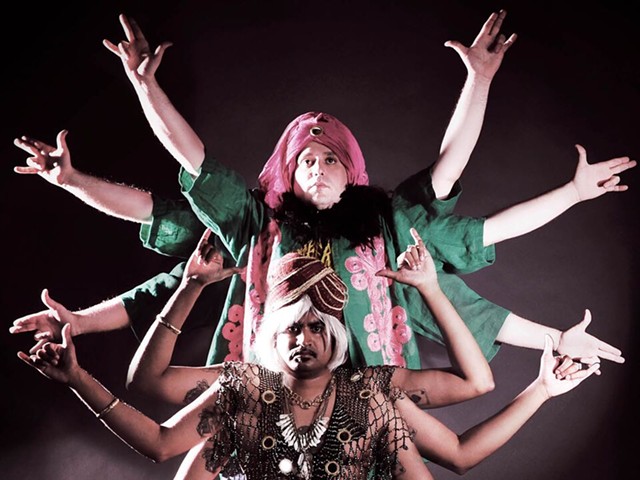Fresh off a multi-Grammy-winning record, The River & the Thread —which received one of the highest chart positions and some of the most critical acclaim of her career— Rosanne Cash isn't showing any signs of slowing down. The country and folk music legend took some time to talk to us on the phone about her past, present, and future ahead of her show at the Macomb Center for the Performing Arts on October 3.
Metro Times: River & the Thread, like all of your work, was pretty personal. Now that you've lived with it for a while, and now that you've been playing it for people, do you have any different perspectives on the songs that you wrote, or have any of the meanings changed?
Rosanne Cash: You know, performing songs over a couple years, some subtleties come out in the songs that I didn't know were there in the beginning, or they may change slightly from night to night, depending on what kind of mood I'm in or what the audience is like. But they have grown in meaning for me in a really beautiful way. Some songs, you know what they are from the beginning and they're solid and they stay that way for years, and some songs develop with the performance, and these have. The characters are still really alive and I've come to know them better. The characters in "When the Master Calls the Roll" and "The Sunken Lands," they're real to me. And "Money Road" has really opened up in a bigger way for me. Not just musically, but I think I learned something about race relations that I didn't know, that I thought I knew but I didn't really know until spending more time in Mississippi and writing that song.
MT: Could you elaborate on that, please?
Cash: Yeah. So I did this show at Dockery Farms in Mississippi, and Dockery Farms was one of the old cotton farms that a lot of blues musicians lived and worked on. They played music at night. And there was no electricity, so they would put a candle in front of a mirror and the light would go across the field, and black workers would come and they'd play music at night. Howling Wolf and Charley Patton and Pops Staples all worked on Dockery Farms.
It hasn't been a working farm in a long time, but my friend Will Porteous, whose grandfather was Joe Rice Dockery, is part of a foundation to restore Dockery Farms and to bring music back to the farm and restore all the outbuildings. It's really an amazing thing. So he loved the record, we became friends, he asked me if I'd do the first concert there. And we did in June, and it was haunting. It was so powerful to be on that spot where this music that had informed so much of this record and my life, where it came from. So this is something in my white girl New Yorker arrogance that I thought that I really got, and isn't it terrible how black people suffered in the South and this whole story is just so painful even to consider 60 years later.
But after the show that night, there was this afterparty, and this almost 90-year-old black blues harp player, Cadillac John Nolden, he played at the party, and everybody was milling around, nobody was really giving him much attention except the guys in my band, who really gave it up to him. I was talking to a lot of people, and I didn't have time. So after everybody left, and I went over to thank him for playing, and he was so deferential. It made me so uncomfortable. I was thinking, 'No, I owe something to you. You're the real deal in this spot.' I borrowed from all of these traditions. He is someone who is still living that. And he just gently said, 'You know, when I was behind the plow in the field, there was a radio at the house and we'd hear your daddy come on, and we'd run out of the fields, gather 'round the radio and listen to your daddy.' And it just chills me to the bone. I just felt this connection that had been there the whole time. It was so moving to me that this man was sweet and so gently told me that story, and I thought how much he must have suffered in his life, living in Mississippi as a black man. I could barely take in how humbling it was, not just personally and ancestrally, but musically, how much I owed to him.
MT: River & the Thread charted so high and it was critically acclaimed, and this was after you've been making music for decades now. Is there a secret to keeping your artistry strong after writing so many songs and doing so many records already?
Cash: Just keep working. Just show up for work. That's 80 percent of it. I read this thing that the writer Elizabeth Gilbert said yesterday. She said, 'There are so many people more talented than me, but they just didn't do the work.' And I kind of feel like that, too. There's so many people more talented than me that you never hear of, but I do the work, and that's a lot of it.
MT: I'll get you out of here on this. What's the best part of being Rosanne Cash?
Cash: Wow, I should think about that more often, because you get so tunnel-vision in what you're doing, you don't think about it. The best part about being me ... I know how to do what I love, and I love what I do.
Rosanne Cash and her band perform at Macomb Center for the Performing Arts, 44575 Garfield Road in Clinton Township, on Saturday, October 3 at 7:30 p.m. Tickets start at $40.





